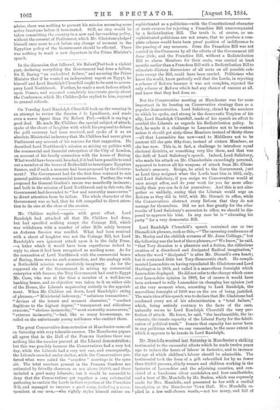But the Conservative meeting at Manchester was far more importaut
in its bearing on Conservative strategy than as a popular demonstration. Lord Salisbury, elated by the numbers to which he spoke, and strong in the democratic Toryism of his Lord Randolph Churchill, made of his speech an effort to overbid the Liberals as regards his Redistribution policy. In fact, he made it a challenge to Lancashire not to be content unless it should get sixty-three Members instead of thirty-three —all that Lancashire has now—and to Middlesex not to be content till she gets fifty-four, instead of sixteen Members, as she has now. This is, in fact, a challenge to introduce equal electoral districts, or something very like them, and that was the drift of Lord Salisbury's speech. Indeed, Lord Salisbury, who made his attack on Mr. Chamberlain exceedingly personal, appeared to borrow all his weapons of attack from Mr. Cham- berlain's armoury. Resign, he cried to the Government, just as Lord Grey resigned when the Lords beat him in 1832, only, said Lord Salisbury, if you resign we Conservatives would at once accept office, and do your work for you far more effec- tually than you can do it for yourselves. And this is not alto- gether so unlikely, seeing that the Liberals would urge on Reform as they did in 1867, with Mr. Disraeli in office, while the Conservatives obstruct every Reform that they do not manage for themselves. Did we not fear greatly for the other results of Lord Salisbury's accession to office, we should be dis- posed to approve his hint. In any case he is " educating his party " for a very democratic Bill.


































 Previous page
Previous page